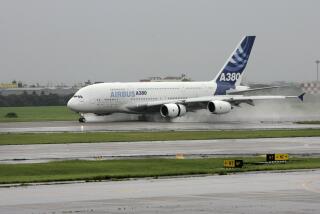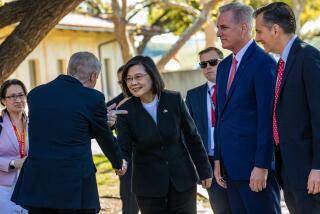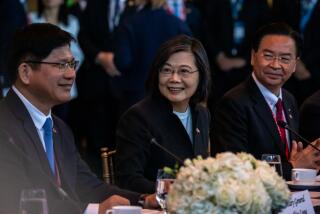Taiwan Asks Airlines to Bar Dissidents
- Share via
TOKYO — The government of Taiwan today asked all airlines flying from Tokyo to Taipei to bar Taiwan opposition leader Hsu Hsin-liang and a delegation of American officials accompanying him from flying to the island, an airline official here said today.
An official with Cathay Pacific, the Hong Kong-based carrier, said his airline and all others in East Asia have been told to keep Hsu, the publisher of a California-based opposition newspaper, and all members of a delegation traveling with him from their planes. Hsu and his party were in Tokyo today and had been planning to fly on to Taiwan this afternoon when it became apparent that they would not be allowed to go.
Among those whom the Taiwan government has apparently barred from the island are former U.S. Atty. Gen. Ramsey Clark and attorney Leonard Weinglass, both traveling with Hsu. At a press conference last week, Clark said he wanted to accompany Hsu to Taiwan because he felt that “the right of return to one’s homeland” is “a fundamental human right. . . . I want to witness whether it is respected” by the Taiwanese government.
On Saturday, a Taiwan Foreign Ministry spokesman said the U.S.-based dissidents were threatening to “undermine the nation’s image and cause social unrest” in Taiwan on the eve of parliamentary elections scheduled for next Saturday.
“They gave us a list of people who can’t go, whether they have visas or not,” said the airline official. He suggested this travel ban may remain in effect at least until after the elections.
Hsu, accompanied by another prominent dissident, Hsieh Tsung-min, had been scheduled to fly from Tokyo to Taipei on a Cathay Pacific flight this afternoon.
It was not clear if the two men would try to fly into Taiwan from another Asian port of embarkation such as Hong Kong.
Broke With Regime
Originally a member of the ruling Kuomintang (Nationalist Party), Hsu broke with the regime in 1977 and won a landslide victory for magistrate, the highest-ranking elected official in Taoyuan, Taiwan. He was also one of the founders of Formosa magazine, an opposition publication that represented the views of the native Taiwanese who make up 85% of the island’s population. Taiwanese activists have long protested the domination of the government by refugees from mainland China.
Hsu, 45, has been charged with sedition in Taiwan for helping to instigate what is known as the Kaohsiung incident--an anti-government demonstration in 1979, which turned into a riot and produced a severe government crackdown. Hsu himself was in the United States at the time of the riot and was subsequently granted political asylum to remain there.
Meanwhile, in Taipei, the Taiwanese capital, authorities deployed armored cars and riot police at the airport today for the anticipated arrival of Hsu and his party, wire services reported.
More than 10 armored cars carrying riot police were parked near the terminal, and an estimated 1,000 security agents and policemen ringed the building.
One airport official called the show of force “the tightest security measure I have ever seen in the airport’s six-year history.”
A senior government official said Friday that the government would deny entry to Hsu, although he added that authorities would “try everything possible” to avoid arresting him.
“We are determined to go back to our homeland,” Hsu said during the Tokyo stopover. “We don’t want confrontation--we don’t want conflict. We just want to get in peacefully.”
Taiwan has been ruled by martial law since the Nationalists were ousted from the Chinese mainland by the Communists in 1949, although ailing President Chiang Ching-kuo, the son of the late President Chiang Kai-shek, recently has shown increased flexibility toward his domestic political opponents and allowed the opposition party to be formed.
Government sources said authorities would rather turn Hsu away than arrest him, because he would face a death sentence if convicted, and the legal proceedings could cause even more strife than his admission.
More to Read
Sign up for Essential California
The most important California stories and recommendations in your inbox every morning.
You may occasionally receive promotional content from the Los Angeles Times.










